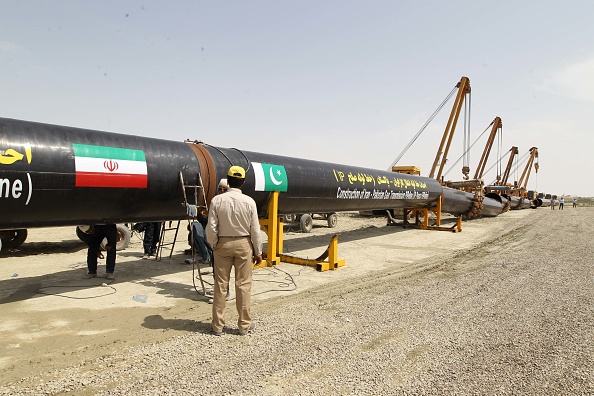Iran and Pakistan are considering ways to complete a long-delayed gas pipeline project between the two countries, Iran’s consul general to Pakistan said on Monday.
Construction on the Pakistani portion of the pipeline has been postponed due to concerns about U.S. sanctions against Iran. [Getty]
Iran and Pakistan’s Consul General to Pakistan Hassan Nourian said on Monday that Iran and Pakistan are considering ways to complete the long-delayed gas pipeline project between the two countries.
“We see Pakistan’s political determination to complete the project,” he told reporters in the southern city of Karachi.
The two countries signed an agreement in 2010 to build a pipeline from Iran’s South Fars gas field to Pakistan’s Balochistan and Sindh provinces, but construction on the Pakistani portion has been delayed due to concerns about U.S. sanctions.
The 1,900-kilometer (1,180-mile) pipeline was intended to supply 750 million to 1 billion cubic feet of natural gas per day for 25 years to meet Pakistan’s growing energy needs.
The Iranian government announced that it has invested $2 billion to build the pipeline within its territory. However, Pakistan did not begin construction due to international sanctions against Iran.
In 2014, Islamabad requested a 10-year extension to construction of the pipeline, which is due to expire in September of this year. Industry sources said Iran may take Pakistan to an international tribunal.
In the face of possible legal action, Pakistan’s interim government gave the green light in principle this year to begin construction on an 80-kilometre section of the pipeline.
Islamabad announced in March that it would seek a waiver of U.S. sanctions for the pipeline. But the United States said it did not support the project and warned of the risk of sanctions in doing business with Tehran.
Nourian said on Monday that the pipeline is not subject to international restrictions and that the two countries are discussing the issue.
He did not respond to questions about possible legal action against Pakistan if Iran does not complete the Pakistani side of the pipeline by the end of the year.
Pakistan’s domestic and industrial users rely on natural gas for heating and energy needs, but the country’s reserves are rapidly dwindling and LNG trading is making supplies more expensive amid high inflation. Therefore, cheap gas is desperately needed.
According to BP’s World Energy Statistics Survey, Iran boasts the world’s second-largest gas reserves after Russia, but Western sanctions, political turmoil and construction delays have slowed its development as an exporting nation.

